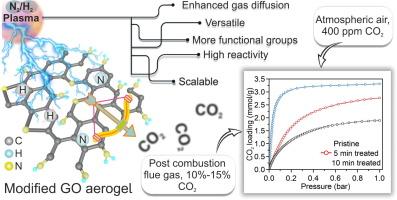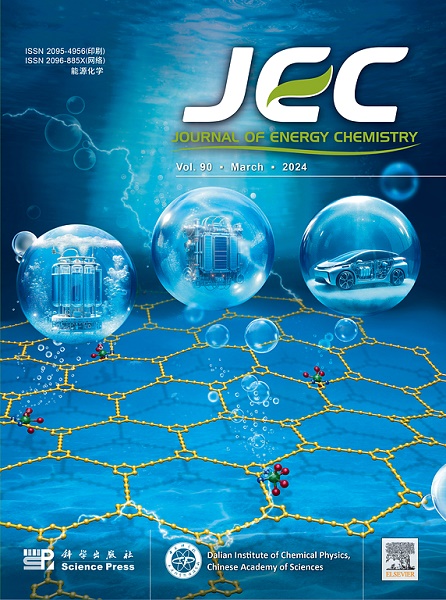Enhanced post-combustion CO2 capture and direct air capture by plasma surface functionalization of graphene adsorbent
IF 13.1
1区 化学
Q1 Energy
引用次数: 0
Abstract
Graphene has enormous potential to capture CO2 due to its unique properties and cost-effectiveness. However, graphene-based adsorbents have drawbacks of lower CO2 adsorption capacity and poor selectivity. This work demonstrates a one-step rapid and sustainable N2/H2 plasma treatment process to prepare graphene-based sorbent material with enhanced CO2 adsorption performance. Plasma treatment directly enriches amine species, increases surface area, and improves textural properties. The CO2 adsorption capacity increases from 1.6 to 3.3 mmol/g for capturing flue gas, and from 0.14 to 1.3 mmol/g for direct air capture (DAC). Importantly, the electrothermal property of the plasma-modified aerogels has been significantly improved, resulting in faster heating rates and significantly reducing energy consumption compared to conventional external heating for regeneration of sorbents. Modified aerogels display improved selectivity of 42 and 87 after plasma modification for 5 and 10 min, respectively. The plasma-treated aerogels display minimal loss between 17% and 19% in capacity after 40 adsorption/desorption cycles, rendering excellent stability. The N2/H2 plasma treatment of adsorbent materials would lower energy expenses and prevent negative effects on the global economy caused by climate change.

石墨烯吸附剂的等离子体表面功能化增强了燃烧后二氧化碳捕获和直接空气捕获能力
石墨烯因其独特的性能和成本效益,在捕获二氧化碳方面具有巨大的潜力。然而,石墨烯基吸附剂存在二氧化碳吸附容量低、选择性差等缺点。本研究展示了一种一步到位、快速且可持续的 N2/H2 等离子处理工艺,用于制备具有更强二氧化碳吸附性能的石墨烯基吸附材料。等离子体处理可直接富集胺物种、增加比表面积并改善质地特性。在捕获烟气时,二氧化碳吸附容量从 1.6 mmol/g 增加到 3.3 mmol/g,在直接空气捕获(DAC)时,二氧化碳吸附容量从 0.14 mmol/g 增加到 1.3 mmol/g。重要的是,等离子体改性气凝胶的电热特性得到了显著改善,与用于吸附剂再生的传统外部加热相比,加热速度更快,能耗大大降低。经过等离子体改性 5 分钟和 10 分钟后,改性气凝胶的选择性分别提高了 42% 和 87%。经过等离子体处理的气凝胶在经过 40 次吸附/解吸循环后,其容量损失极小,仅为 17% 至 19%,具有极佳的稳定性。对吸附材料进行 N2/H2 等离子处理可降低能源消耗,防止气候变化对全球经济造成负面影响。
本文章由计算机程序翻译,如有差异,请以英文原文为准。
求助全文
约1分钟内获得全文
求助全文
来源期刊

Journal of Energy Chemistry
CHEMISTRY, APPLIED-CHEMISTRY, PHYSICAL
CiteScore
19.10
自引率
8.40%
发文量
3631
审稿时长
15 days
期刊介绍:
The Journal of Energy Chemistry, the official publication of Science Press and the Dalian Institute of Chemical Physics, Chinese Academy of Sciences, serves as a platform for reporting creative research and innovative applications in energy chemistry. It mainly reports on creative researches and innovative applications of chemical conversions of fossil energy, carbon dioxide, electrochemical energy and hydrogen energy, as well as the conversions of biomass and solar energy related with chemical issues to promote academic exchanges in the field of energy chemistry and to accelerate the exploration, research and development of energy science and technologies.
This journal focuses on original research papers covering various topics within energy chemistry worldwide, including:
Optimized utilization of fossil energy
Hydrogen energy
Conversion and storage of electrochemical energy
Capture, storage, and chemical conversion of carbon dioxide
Materials and nanotechnologies for energy conversion and storage
Chemistry in biomass conversion
Chemistry in the utilization of solar energy
 求助内容:
求助内容: 应助结果提醒方式:
应助结果提醒方式:


